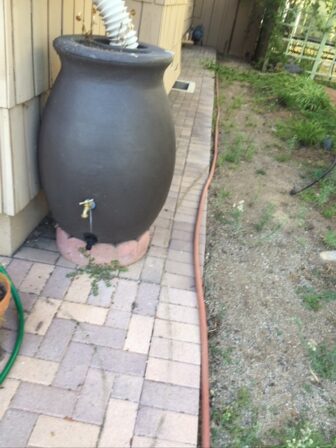Water Wise and Water Weary
Over the past few years we have heard more and more about conserving water. I often wonder about the practicality of some of these methods. Some make a great deal of sense. Others sound good but won’t work. Still others are rather bizarre.
One of the oddest water-saving methods I’ve heard of is for plants. When you pot a plant or start one from a seed, a great help is to mix polymer into the soil, 50-50. The additive SoilMoist can be purchased at your local nursery. $4.99 buys a three-ounce bag. I watched a video suggesting that the polymer in a “new or gently used” adult diaper will produce many cups of this stuff. Remove and discard the padding keeping only the crystals inside. Mix them with an equal amount of potting soil. Polymer can be spooned into the soil of established plants by carefully loosening the soil with a fork, using a spoon to add the polymer, and then mix it with the fork. It aerates the soil as well as conserving moisture. If you are obviously over 60, you may want to ask a child to buy the diapers for you or wear very tight leggings.
Another odd water-saving method I found on the internet is a little grosser than the “gently used” diaper. That article recommended combining showering with urinating. Even though your mother wouldn’t approve, it saves water.
Using a bidet is another great way to save water. It is a little like spot cleaning. I wish they were as omnipresent in the U.S., as they are in Europe.
Our neighbors are saving water in a way that really appeals to me. They have very pretty cisterns posted at each downspout. They have another to capture the washing machine’s grey water. This only works if the grey water comes from a source higher than the area needing water. Otherwise you would need a pump to get the water uphill.
Left-over water from cooking and drinking is relished by plants. Black coffee gives a nice shot of acid to hydrangeas and gardenias. Saving shower water while waiting for it to heat is better than letting it go down the drain. Plants like it, and cisterns can store it, and your used soapy water can clean the floors! Do time your showers.
A timed drip system with spigots set at each plant is ideal. Group plants with similar water needs together. The drip system is far more efficient that watering by hose. If you do have a hose, make certain the nozzle shuts off when you release the handle. Watering systems should go on early in the morning, just before dawn, to mitigate evaporation. Sprinklers should not go on unless the ground is dry. A moisture probe is a good investment since our heaviest rainfall doesn’t seem to penetrate more than one inch into the soil.
We need to abandon our lovely English gardens and learn to like succulents instead. If you think of them as sculptures with color and texture, you may find them more appealing. They certainly have lower water needs than rose gardens. Replacing lawns with succulents or gravel and succulents saves water because lawns are thirsty. Synthetic turf is not a good solution as it does not allow water to penetrate the soil which is essential for restoring water’s purity.
Another method of saving water seems a bit at arm’s length. Eating at least one vegetarian meal a week is water saving measure. We feed cattle, sheep and other grazing animals grain. Grains consume enormous quantities of water.
Whenever possible, use recycled paper products. Virgin paper uses much more water than do 100 percent recycled paper products. If you use four rolls of paper towel a week, recycled paper will save 637 gallons of water as opposed to virgin paper.
A compost bin for greens from garden and kitchen saves water instead of using the garbage disposal. In fact, save the garbage disposal for things that will stink. Everything else belongs in the trash. Separate the greens from the meat, dairy, eggs, fish and poultry before you head to the sink. Put the greens out for compost and let the trash collectors have most of the rest. Filling the sink with clear water and using it for pre-washing dishes before they go in the dishwasher. A dog can ready a plate for the dishwasher with his tongue.
You can save water in the way you use your washing machines and dishwashers. Always run full loads. Do not use the extra rinse cycles. Light washing cycles do just as good a job and use far less water. All this talk about saving water has become tiresome. Sadly, it is a fact of life. Even our wild fires are affected by our drought. We must do what we can to save.
Join us September 23 from 6 to 8 at 4070 Jackdaw Mission Hills United Church of Christ. This will be an open house for new and renewing members and guests. Vendors will have giveaways, special prices and information
Category: Local News








